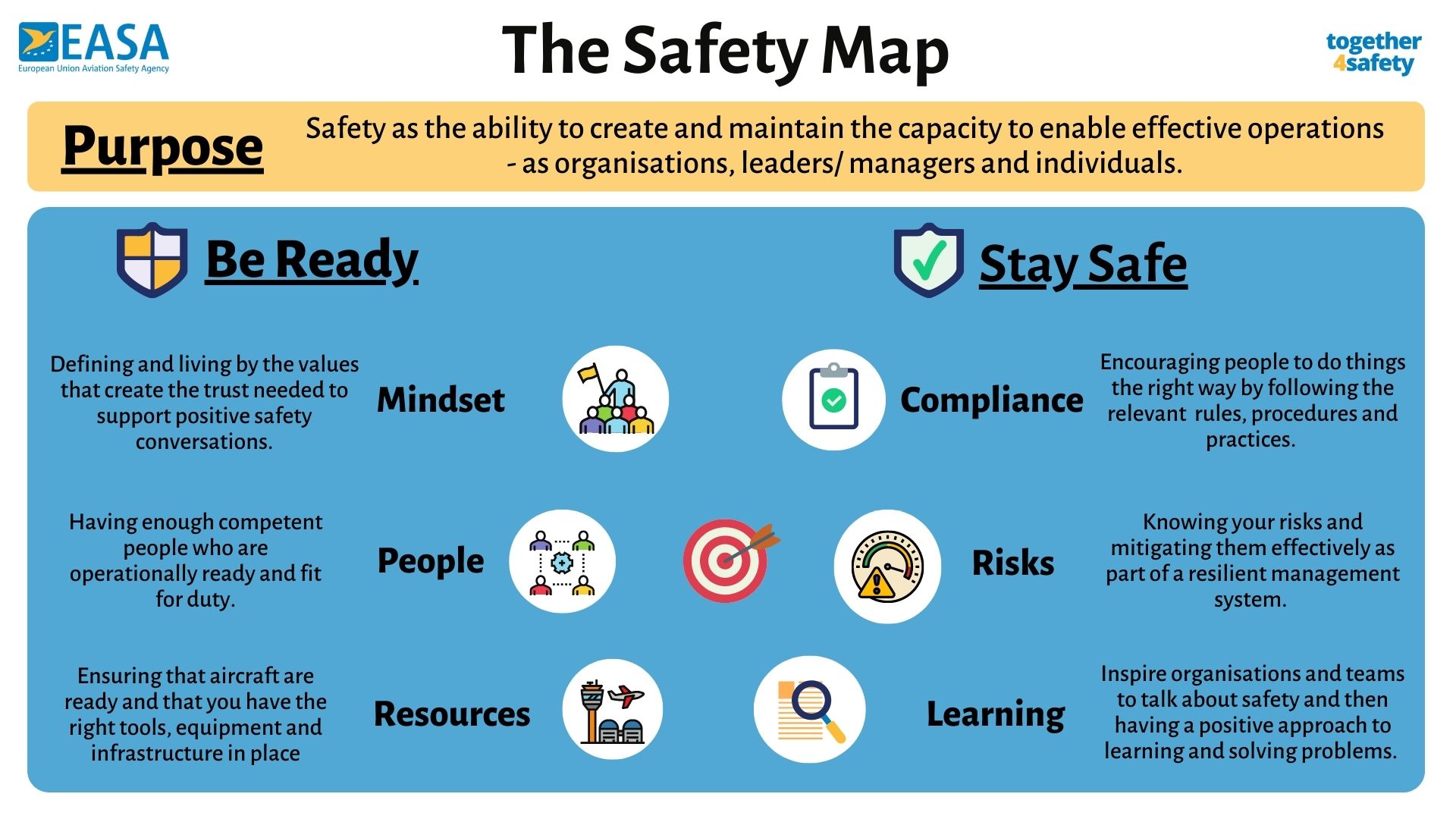One of the key outcomes from the Germanwings accident was EASA rules covering the topics of support programmes (also know as peer support) and also alcohol testing and psychoactive substances.
These rules were implemented in February 2021 in the Air Operations Regulation (Commission Regulation (EU) No 965/2012) by Commission Regulation (EU) 2018/1042 (ARO.RAMP.106 ‘Alcohol testing’, CAT.GEN.MPA.170 ‘Psychoactive substances’, CAT.GEN.MPA.175 ‘Endangering safety’ and CAT.GEN.MPA.215 ‘Support programme’).
As a follow up task EASA was required to produce a first report on the results of the review of these new rules. A 102 page report has now been published with that evaluation.
Download and read the report here.
Mental health as a key part of the Safety Map
You will hopefully recall our Safety Map with 6 key building blocks that make up safe and effective operations: Mindset, People, Resources, Compliance, Risks and Learning. The people box has the goal to "have enough competent people who are operationally ready and fit for duty". The mental health of all staff plays a key part in effective human performance.

Peer support programmes are just one part of this and we have talked a lot about Wellbeing on the Air Ops Community. In the coming months we will do a lot more work to define the concept of "operationally ready and fit for duty". This will help to support the implementation of these specific rules but also to set them in the wider context of helping our people perform to their best.
Interestingly, as with everything in the Safety Map - when it comes to peer support and associated topics there is a link between the "People" element and "Mindset". Without trust, people won't feel comfortable to seek mental health support when they really need it.
Ultimately though it is important to remember that support programmes are the treatment of the problem. This is why it is important that every aviation organisation considers psychological health and safety in their management system. To quote Desmond Tutu - There comes a point where we need to stop just pulling people out of the river. We need to go upstream and find out why they're falling in. Expect a lot more information to help you and your organisation understand how to do this in the near future.
Summary and Key Points
The report mainly evaluates the level of implementation by EASA Member States and commercial air transport (CAT) operators concerning support programmes, the psychological assessment of flight crew and the systematic and random testing for psychoactive substances.
It has only been a short period of time since implementation but the evaluation also seeks to provide an insight into the issues/constraints faced by stakeholders during the implementation.
The report is based primarily on data collected through surveys of stakeholders, validated by the EASA Advisory Bodies in a dedicated consultation process.
The key points are:
- A very high percentage of responding operators report that the implementation of the provisions is at the operational stage, although for certain elements it may still be incomplete.
- Unsuprisingly, some parts are more challenging than others, particularly for some small/non-complex operators and in helicopter operations.
- The major constraints that play or have played a role in implementation are difficulties in finding mental health professionals and peers, the lack of a qualified psychologist or a qualified testing provider, limited training or management resources due to the COVID-19 pandemic, and budget considerations.
Despite the overall high implementation rate of the provisions that is reported by the operators, there is limited data on the use of the provisions, and it is too early to draw any conclusions about the overall effectiveness in the EASA Member States of the provisions that have been mandated.
It should also be noted that the responding aeroplane CAT operators represent about 14% of all aeroplane CAT operators in the EASA Member States, and the helicopter CAT operators only 5 % of their own population.
View of flight and cabin crew
When it comes to responses from flight and cabin crew, there is a lot of support for these new rules but confidence in the effectiveness of the provisions is not yet shared by everyone. Comments suggest areas for improvement, in particular regarding the protection of personal data and privacy.
Recommendations and follow up
Finally, the evaluation makes recommendations to help improve the implementation of the rules and ensure they play an effective role in improving aviation safety. These recommendations can be summarised as follow:
- Concern about the complexity and proportionality of the rules as regards the size of the operator.
- The need to establish and promote professional standards for mental and psychological health professionals active in support programmes.
- The need to ensure the quality of psychological assessments as regards the standards of service providers, the validity of tests and the transparency of the assessment to flight crew.
- Support for national authorities to help them work from a common understanding about quality standards for properly functioning support programmes and psychological assessment
- The need to improve the quality of the testing processes for psychoactive substances, in particular addressing privacy and discretion, along with confirmation test equipment.
Please log in or sign up to comment.